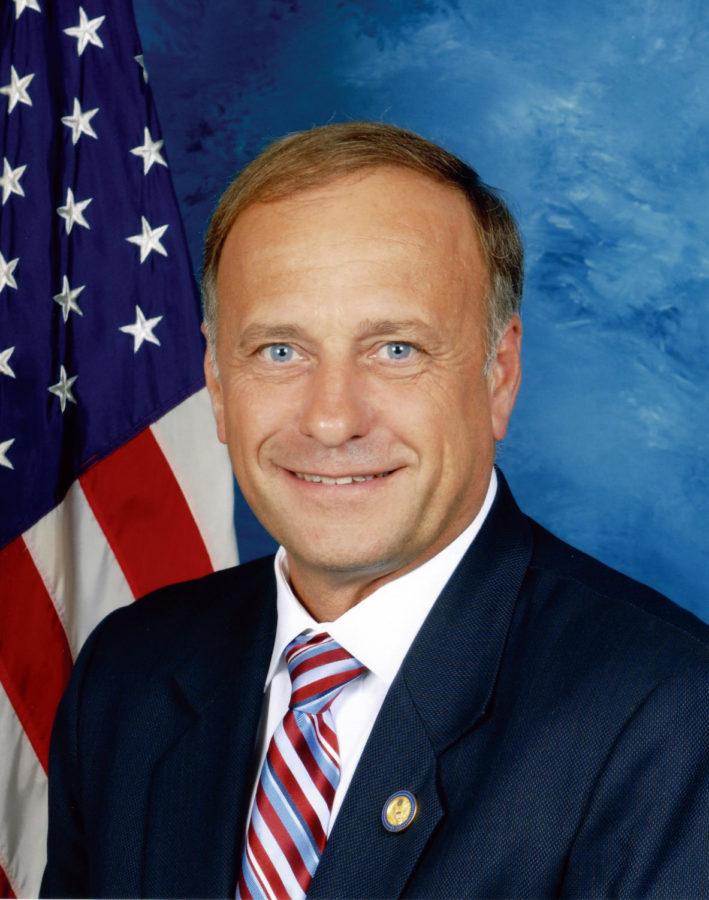McLaughlin: King’s views disagree with constituents
March 23, 2014
The Arizona Legislature recently attempted to pass a law to “protect religious freedom” which was vetoed by Governor Jan Brewer on February 26. If passed, SB 1062 — also known as the “Gay Jim Crow Law” — would have allowed business owners to refuse service to anyone, including LGBT individuals, and protect themselves from discrimination lawsuits by claiming religious liberty.
Steve King, the Republican representative from Iowa’s fourth congressional district — Ames’ district — defended the already dead bill on March 2 in an interview on WHO TV’s “The Insiders.” King also expressed disappointment in Gov. Brewer for vetoing the bill.
“It’s clear in the Civil Rights section of the code that you can’t discriminate against people based upon, and I’m not sure I’ve got the list right, but race, creed, religion, color of skin — those kind of things. And there’s nothing mentioned in there on self-professed behavior.” King said, “And that’s what they’re trying to perfect [sic] is special rights for self-professed behavior. And I think it’s difficult for us to define a law that would protect behavior.”
King expands on his rhetoric by saying “The one thing that I reference when I say “self-professed” is: How do you know who to discriminate against? They about have to tell you. And, you know, are they then setting up a case?”
This isn’t the first time Steve King has made controversial remarks especially against gay rights. He is no stranger to making extremely provocative statements. He has even received criticism from his own party for speech seen as derogatory toward immigrants living in the United States illegally.
King states that the bill was to protect religious business owners from being sued for their beliefs. King indicates that homosexuality is a behavior which is not “immutable” or a “characteristic that can be independently verified and cannot be willfully changed.” Religion doesn’t exactly fit this definition either, but it is protected in the Civil Rights Act.
That is not to say that government should completely remove the right to refuse service. There is a good reason we give businesses that right. Customers who are rude and loud don’t deserve to get their way when they disrespect the employees. Restaurant owners don’t want people walking into their establishments not wearing shoes or shirts — that is unsanitary. The problem is that the right to refuse service could be abused and be used to fuel hatred and discrimination.
Opposition can say that the invisible hand of the free market would weed out these anti-gay businesses because they will lose business over their discrimination. The invisible hand doesn’t always seem to regulate hatred when there’s a sizable number of people backing it up. Remember when Chick-fil-A made record sales after its CEO made an anti-gay statement? As it turns out, bigoted speech may not be so bad for someone’s business, as long as others agree.
Regardless of the intention of the bill to preserve religious rights, SB 1062 was written vaguely. Gov. Brewer vetoed the bill, saying, “Senate Bill 1062 has the potential to create more problems than it purports to solve.” It is important to preserve religious rights, but the bill could also be opening an avenue to refuse service solely on discrimination. If a shop owner can refuse service to a gay person because his religion says so, what is stopping him from refusing services to people of other faiths because they don’t agree with his religious views or anyone else for that matter?
ISU students need to keep in mind that Steve King is their voice in government and represents them. Do the students who are a part of a generation that supports drastic social progress want to have a narrow-minded viewpoint such as Steve King’s represent them? King will be up for reelection this upcoming November, which will be his first time running as an incumbent for fourth district, despite being a veteran politician. It’s uncertain whether the student population in Ames will make its voice heard. Until then, he will be our representative and we can only wait and see what he says next.







